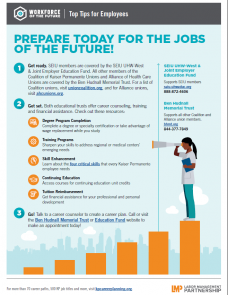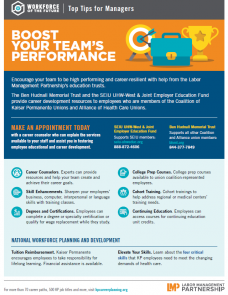Hank Q1-2018
See the whole issueNavigating the Future
For Carolina Aceves, technology and health care go hand in hand.
Shortly after completing a new online digital fluency course for Kaiser Permanente employees, she saw firsthand how technology can transform a life. Her mother needed a kidney transplant, but neither she nor her siblings were a match. In October 2017, however, in a series of matches orchestrated through a national computer system, she donated a kidney as part of a chain of donations that resulted in her mother receiving a kidney.
In December, she returned to work at the California Service Center in San Diego, where she is an account administrative representative, fielding calls from KP members and answering their questions. She also chairs a young leader council for OPEIU Local 30 — and is leveraging that role to mobilize all represented members of her unit-based team, urging colleagues of all ages to take the digital fluency course.
“Health care is changing,” Aceves says. “Be current. Do your homework. Advance your career.”
At ease with technology
Digital fluency is one of four critical skills that will be essential in the health care of the future. The new online program, which helps participants understand the role of technology in health care, is free to workers represented by a union in the Coalition of Kaiser Permanente Unions through the Ben Hudnall Memorial Trust, the SEIU UHW-West & Joint Employer Education Fund, and National Workforce Planning and Development.
The national workforce office also is developing programs for the other three critical skills — consumer focus, collaboration and process improvement — as part of a larger strategy to encourage employees to upgrade their skills, advance their careers and meet the changing demands of health care.
“Whether you work in a medical center, clinic or office, we encourage employees to take the digital fluency program,” says Monica Morris, the director of National Workforce Planning
and Development.
Digital fluency skills are good for workers, KP members and the organization, says Jessica Butz, the coalition’s national coordinator for Workforce Planning and Development. While some may fear technology will eliminate jobs, the push at KP is to use it not to replace workers but to enhance the care and service they deliver.
“Learning these critical skills will prepare our workers for jobs in the future and give them the tools to shape and improve care for our members and patients,” Butz says.


